
A trick-taking game is a card or tile-based game in which play of a hand centers on a series of finite rounds or units of play, called tricks, which are each evaluated to determine a winner or taker of that trick. The object of such games then may be closely tied to the number of tricks taken, as in plain-trick games such as contract bridge, whist, and spades, or to the value of the cards contained in taken tricks, as in point-trick games such as pinochle, the tarot family, briscola, and most evasion games like hearts. Trick-and-draw games are trick-taking games in which the players can fill up their hands after each trick. In most variants, players are free to play any card into a trick in the first phase of the game, but must follow suit as soon as the stock is depleted. Trick-avoidance games like reversis or polignac are those in which the aim is to avoid taking some or all tricks.

Preferans or Russian Preference is a 10-card plain-trick game with bidding, played by three or four players with a 32-card Piquet deck. It is a sophisticated variant of the Austrian game Préférence, which in turn descends from Spanish Ombre and French Boston. It is renowned in the card game world for its many complicated rules and insistence on strategical approaches.
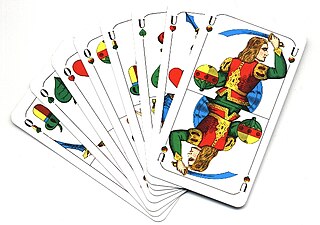
Schafkopf, also called Bavarian Schafkopf, is a popular German trick-taking card game of the ace–ten family for four players that evolved, towards the end of the 19th century, from German Schafkopf. It is still very popular in Bavaria, where it is their national card game played by around two million people, but it also played elsewhere in Germany and in Austria. It is an official cultural asset and important part of the Old Bavarian and Franconian way of life. Schafkopf is a mentally demanding pastime that is considered "the supreme discipline of Bavarian card games" and "the mother of all trump games."

Cego is a Tarot card game for three or four players played mainly in and around the Black Forest region of Germany. It was probably derived from the three-player Badenese game of Dreierles when soldiers deployed from the Iberian Peninsula during the Napoleonic Wars and, based on a Spanish game they had encountered, introduced Cego's distinctive feature: a concealed hand, or blind. Cego has experienced a revival in recent years, being seen as part of the culture of the Black Forest and surrounding region. It has been called the national game of Baden and described as a "family classic".
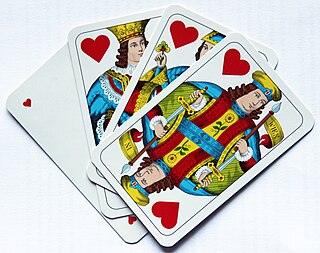
Préférence, frequently spelt Preference, is a Central and Eastern European 10-card plain-trick game with bidding, played by three players with a 32-card Piquet deck, and probably originating in early 19th century Austria, becoming the second most popular game in Vienna by 1980. It also took off in Russia where it was played by the higher echelons of society, the regional variant known as Preferans being still very popular in that country, while other variants are played from Lithuania to Greece.

Bauerntarock also called Brixentaler Bauerntarock or Brixental Tarock, is a point-trick card game played in the Brixental, Austria. It may have originated in the 19th century either as an adaptation of 54-card Tapp Tarock onto the cheaper and smaller 36-card German pack. Another possibility is that it was adapted from the 78-card Grosstarock or Taroc l'Hombre game as the ratio of trumps to non-trumps is almost the same. It uses the Skat Schedule found in popular regional games such as Jass and Schafkopf. It is closely related to Bavarian Tarock, German Tarok, Württemberg Tarock and especially Dobbm. Like Bavarian Tarock and Tapp, Brixental Bauerntarock and Dobbm do not belong to the true tarot games, but have adopted rules from Tapp Tarock. The most fundamental difference between these games and true tarot games is in the use of German or French decks instead of true Tarot playing cards.

Bavarian Tarock or, often, just Tarock, is a card game that was once popular in Bavaria and also played in parts of Austria as well as Berlin. The name is a clue to its origin in the historical German game of [Gross-]Tarock, a game using traditional Tarot cards. At some point in the mid- to late-18th century, attempts were made to emulate Taroc using a standard 36-card German-suited pack, resulting in the formerly popular, south German game of German Tarok. During the last century, the variant played with a pot (Haferl) and often known as Bavarian Tarock or Haferltarock, evolved into "quite a fine game" that, however, has less in common with its Tarock progenitor. German Tarok also generated the very similar game of Tapp, played in Württemberg, and both are related to Bauerntarock, Dobbm and the American games of frog and six-bid solo. Bavarian Tarock should not be confused with Königrufen, also known as Austrian Tarock or just Tarock.

Tapp is a trick-taking, card game for 3 or 4 players using 36 French-suited cards that is played in the south German region of Swabia, especially in the former Kingdom of Württemberg. It is the French-suited offshoot of German Tarok; its German-suited form being called Württemberg Tarock in that region. Tapp is one of a family of similar games that include Bavarian Tarock, the Austrian games of Bauerntarock and Dobbm, and the American games of frog and six-bid solo. Although probably first played in the early nineteenth century, the game of Tapp is still a local pastime in its native Württemberg, albeit in a greatly elaborated form.

Dobbm or Tappen is a card game played in the Stubai valley in Austria and is one of a family of games derived from the Tarot game of Grosstarock by adapting its rules to a regular, shortened pack of 36 cards. The ranking and point value of the cards in Dobbm is typical of the family and, like its other members, one player always plays as a soloist against all the others. It is highly popular in the Stubai valley among card players of all generations, but is unknown in the surrounding regions.

Dreierschnapsen, Talonschnapsen or Staperlschnapsen is a three-hand variant of the popular Austrian card game, Bauernschnapsen. The rules are very similar to those for Bauernschnapsen except that, instead of two teams of two players, one player bids to become the soloist against the other two who form a temporary alliance. Another difference is that the game makes use of a talon with which the soloist may exchange cards to improve his hand, hence its alternative name of Talonschnapsen. The game is usually played with William Tell cards.

Brandeln is an historical card game for three or four players; in which the winning bidder plays alone against the rest. It is one of the earliest games to use the terms Bettel – a contract to lose every trick – and Mord - a contract to win every trick. One of several card games mastered by Mozart, Brandeln is still current in Austria and Germany today. It has been described as having a "civilized, refined and ingenious character" and "one of the most pleasant card games".

Droggn, sometimes called French Tarock is an extinct card game of the Tarock family for three players that was played in the Stubai valley in Tyrol, Austria until the 1980s. Droggn is originally local dialect for "to play Tarock", but it has become the proper name of this specific Tarock variant. An unusual feature of the game compared with other Tarock games is the use of a 66-card deck and that, until recently, there was no record in the literature of a 66-card game and no current manufacturers of such a deck. The structure of the game strongly indicates that it is descended from the later version of Tarok l'Hombre, a 78-card Tarock game popular in 19th-century Austria and Germany, but with the subsequent addition of two higher bids.

Grasobern, Grasoberl, Grasoberln, Graseberla, Grünobern, Lauboberl or Laubobern is a card game that was once commonly played in Old Bavaria, especially in the old counties of Bad Aibling and Rosenheim, and is still popular in eastern Bavaria, especially in Upper Palatinate. The game has relatively simple rules and thus a rather relaxing and leisurely character without the mental demands of Schafkopf or psychological stress of Watten, two other traditional Bavarian card games. The name is taken from the game's penalty card, the Ober of Leaves. The suit of Leaves is known in German variously as Laub, Gras ("grass") or Grün ("green").
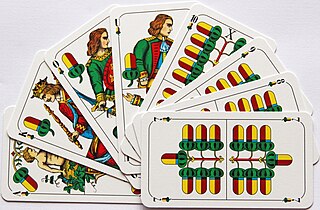
Wallachen is an Old Bavarian card game, which used to be very popular in eastern Bavaria. Although, by 2012, it had become a rarer sight at pub tables, there have been more recent moves to revive it. Wallachen is a relatively simple three-hander that is easy to learn. As a result, like Grasobern, it has a relatively relaxed character without the mental demands of Schafkopf or the psychological stress of Watten. It is a member of the Préférence family of card games.

Blattla is a Bavarian card game for four players, who usually form two teams of two for each deal. It is a simplified version of Schafkopf and Bierkopf and is thus a point-trick game. Unlike those two games, in Blattla the Obers and Unters are not permanent trumps. In order to learn the rules of Schafkopf, it can be an advantage to first become familiar with Blattla. The game is traditionally played with Bavarian pattern cards.

Herzla or Herzl'n is a Bavarian, reverse trick-taking, card game for 4 players in which the aim is to avoid taking any Hearts. There is a simpler variant for children and adults that may be played by 3-8 players.
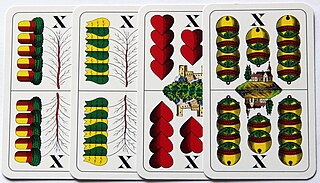
Matzlfangen is a traditional point-trick, card game for 4 players that originated in the Bavarian province of Upper Palatinate over 200 years ago and spread to Austria. It is still played in a few places today. The game is named after the ten or Matzl, which plays a key role.
Ramscheln, also called Ramsch, is a German card game for three to five players, which is usually played for small stakes. It is a variant of Mönch and a member of the Rams group of card games characterised by allowing players to drop out of the current game if they think they will be unable to win any tricks or a minimum number of tricks. It should not be confused with Ramsch, an unofficial contract in Skat, played when everyone passes, in which the aim is not to score the most card points.
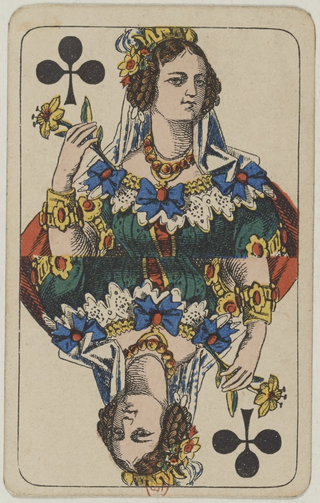
Sjavs is a Danish card game of the Schafkopf family that is played in two main variants. In Denmark, it is a 3-player game, played with a shortened pack of 20 cards; in the Faroe Islands, where it is very popular, it is a four-hand, partnership game using a standard piquet pack of 32 cards.
Schlauch is an extinct Bavarian point-trick card game that was popular in the mid-19th century as a drinking game, hence it was also known as Bier-Schlauch.
















